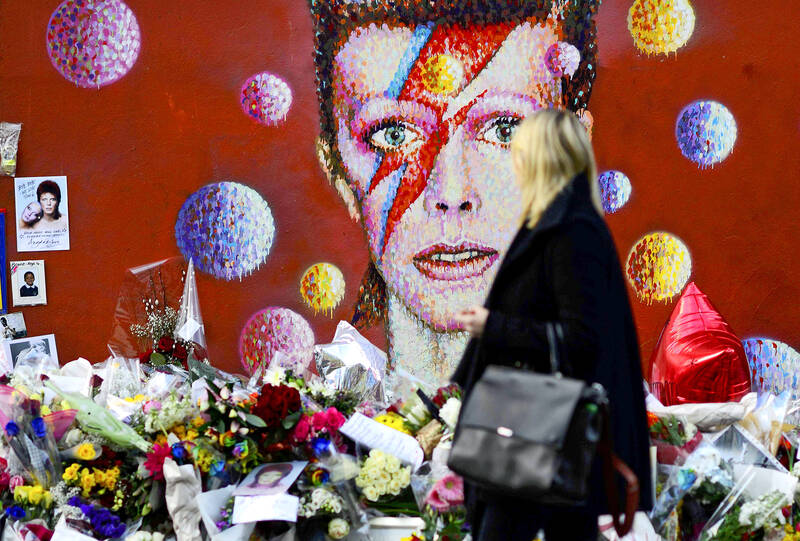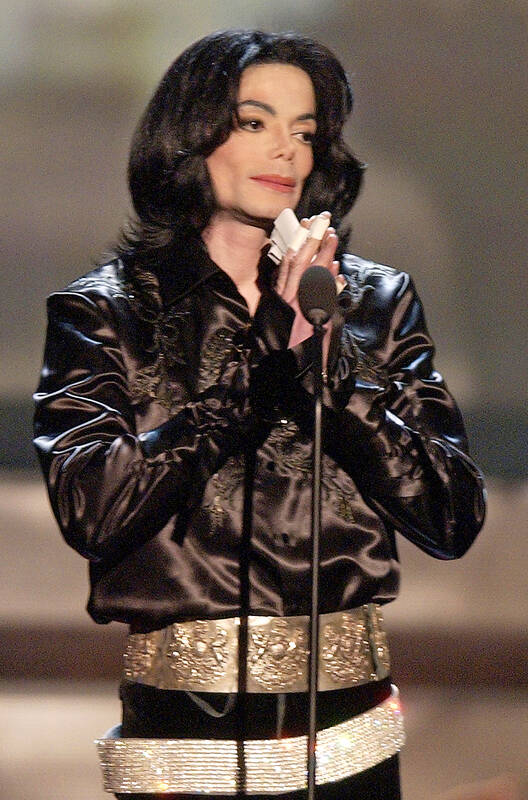Was a Michael Jackson jukebox musical really such a good idea? When MJ the Musical opened in London last week, it was praised for its gravity-defying dancing and raft of floor-filling megahits. But one glaring oversight was unfailingly remarked upon. “In MJ,” ran the New York Times headline, “no one’s looking at The Man in the Mirror.” The show, it added, told the story of Jackson, “except for the big story.”
As Anya Ryan put it in the Guardian’s two-star review: “It is hard to ignore the repeated allegations of child sexual abuse. Yet Lynn Nottage’s script does just that.”
Almost five years after Leaving Neverland, in which two men accused Jackson of sexually abusing them when they were children, it seems not everyone has got the message that the star is “canceled.” In fact, to all intents and purposes, Jackson is not canceled at all. That’s certainly what the money suggests, with Sony recently buying half of his back catalog for a figure believed to be around £500m.

Photo: Reuters
Then there’s a forthcoming biopic starring Jackson’s nephew Jaafar in the lead role. According to Billboard, the Jackson estate earns around US$75.4 million a year from his music, royalties, theatrical shows and merchandise.
So how has this happened? How come some artists seem impervious to the supposed huge shifts in public opinion in the wake of #MeToo and Black Lives Matter? David Bowie is a striking example. Claims after his death by Lori Mattix and Dana Gillespie that he had had sex with them when they were under the age of consent (15 and 14, respectively) have largely been ignored, dismissed or at least treated completely differently to other male stars similarly accused. Is it because the women in question bore no ill will towards Bowie, with Mattix saying their encounter was “so beautiful … Who wouldn’t want to lose their virginity to David Bowie?”
If, as we are led to believe, cancel culture is so pervasive, why does Bowie remain a hero? Are there some artists whose reputations will survive anything simply because they’re so adored? Or is there more to it than that?

Photo: AP
I initially thought there might be some clear-cut factors that helped determine why some artists are ostracized and others are not. For instance, you might think still being alive makes you more cancelable — your misdemeanors will not only be more current but you’re also still around to profit from your art. But the very much dead Ike Turner (accused of multiple violent incidents by his former wife Tina Turner) could easily be described as canceled, whereas non-dead Chris Brown (who pleaded guilty to felony assault of his then-girlfriend Rihanna) is still getting Grammy nominations.
How do you grapple with cases in which there are conflicting views and gray areas? Does Morrissey’s embrace of far-right political groups such as For Britain have to be weighed on some kind of moral scale against Johnny Marr’s progressive values, to work out if the Smiths are canceled? Should Benjamin Zephaniah be shunned for being violent towards a former girlfriend, or is he excused because he was the one who wrote about it, expressing regret and the need to be better? Before long, my list of factors had spiralled into a tangle of nuances and contradictions.
With all these questions rolling around my head, I turned to other writers for advice. In her book Monsters: A Fan’s Dilemma, Claire Dederer writes about the specific pull Bowie had on young minds: “David Bowie was the patron saint of weird kids … For kids like me, there was a sense of ownership; Bowie was ours.
This intense connection meant that many overlooked the accusations. But for Dederer, it made them cut deeper. Other famous bands might have slept with teenage girls, she writes, “but not our guy.” So does it just come down to an emotional attachment?
Not everyone is on board with Dederer’s thinking. Jessa Crispin, critic and editor of Substack publication The Culture We Deserve, criticized Monsters for an overreliance on emotions over intellect and logic. She believes Bowie has avoided cancellation because “anyone who built up a loyal following before the advent of social media is ultimately immune from it. That doesn’t mean they won’t come in for rounds of backlash, but the affection people have for their work will survive.”
This is not the first time Bowie has faced a backlash. In the 1970s, he was called out for expressing sympathy with the far right and calling Hitler the “first rock star.” But Jerome Soligny, who wrote last year’s Bowie biography Rainbowman, doesn’t believe the accusations amount to much.
“Bowie did say a couple of things he would regret later. Who didn’t? A lot was written at the time but we know now it was misconception from the press. Any fans who’ve read my work would know that Bowie was certainly not a right-wing racist.”
And the accusations that he slept with young teenagers? “I’ve talked with Dana many times. Obviously, with rock stars, everything could have happened. And everything did. Regarding Bowie and a few other famous musicians, what they brought to the world is so huge that, yes, people tend to forget.”
The more people I speak to, the clearer it becomes that nobody has fixed views on what cancellation involves, or even what it is. In truth, “canceled” is a fairly woolly term that can get confused with public criticism. Artists have long been attacked when their behavior has upset certain groups of society, from the Beatles (whose records were actually burned after John Lennon claimed they were “bigger” than Jesus) to the Chicks (who were blacklisted by some country music radio stations for criticizing President George W Bush in the lead-up to the Iraq war). Rarely does it mean that an artist is completely finished. People still watch Harvey Weinstein’s films even though he’s rotting in jail. Even R Kelly, perhaps the most open-and-shut case of cancellation imaginable, racks up 5 million listeners on Spotify each month. So does cancel culture really exist at all?
Crispin says it does, but perhaps not in the way we had originally intended. “There is something at the root of cancel culture,” she says, “that comes out of a frustration that certain people are given the opportunity and means to abuse other people with impunity, and that the abuse has been disproportionately suffered by marginalized people, whether it is women, trans people, non-white people, and so on.”
But in reality, proper cancellation probably only happens for “people who don’t have the monolithic presence in their field — the debut artists, the non-tenured professor, the writer with only a couple of books out,” she says.
Artists will often “survive” cancellation, whatever we mean by that, because there are sufficient people out there who approach their art unencumbered with conflicted feelings about doing so. There are no set rules, because we each make our own rules. Which is why for some people, R Kelly (canceled!) is still fine to listen to, while for others Bowie (not canceled!) is persona non grata.

A “meta” detective series in which a struggling Asian waiter becomes the unlikely hero of a police procedural-style criminal conspiracy, Interior Chinatown satirizes Hollywood’s stereotypical treatment of minorities — while also nodding to the progress the industry has belatedly made. The new show, out on Disney-owned Hulu next Tuesday, is based on the critically adored novel by US author Charles Yu (游朝凱), who is of Taiwanese descent. Yu’s 2020 bestseller delivered a humorous takedown of racism in US society through the adventures of Willis Wu, a Hollywood extra reduced to playing roles like “Background Oriental Male” but who dreams of one day

Gabriel Gatehouse only got back from Florida a few minutes ago. His wheeled suitcase is still in the hallway of his London home. He was out there covering the US election for Channel 4 News and has had very little sleep, he says, but you’d never guess it from his twinkle-eyed sprightliness. His original plan was to try to get into Donald Trump’s election party at Mar-a-Lago, he tells me as he makes us each an espresso, but his contact told him to forget it; it was full, “and you don’t blag your way in when the guy’s survived two

The entire saga involving the Taiwan People’s Party (TPP) and its Chairman Ko Wen-je (柯文哲) continues to produce plot twists at such a rapid pace that fiction publishers would throw it out for being ridiculously improbable. This past week was particularly bizarre, but surprisingly the press has almost entirely ignored a big story that could have serious national security implications and instead focused on a series of salacious bombshell allegations. Ko is currently being held incommunicado by prosecutors while several criminal investigations are ongoing on allegations of bribery and stealing campaign funds. This last week for reasons unknown Ko completely shaved

The self-destructive protest vote in January that put the pro-People’s Republic of China (PRC) side in control of the legislature continues to be a gift that just keeps on giving to the Chinese Nationalist Party (KMT). Last week legislation was introduced by KMT Legislator Weng Hsiao-lin (翁曉玲) that would amend Article 9-3 of the Act Governing Relations Between the People of the Taiwan Area and the Mainland Area (臺灣地區與大陸地區人民關係條例) to permit retired and serving (!) military personnel to participate in “united front” (統戰) activities. Since the purpose of those activities is to promote annexation of Taiwan to the PRC, legislators